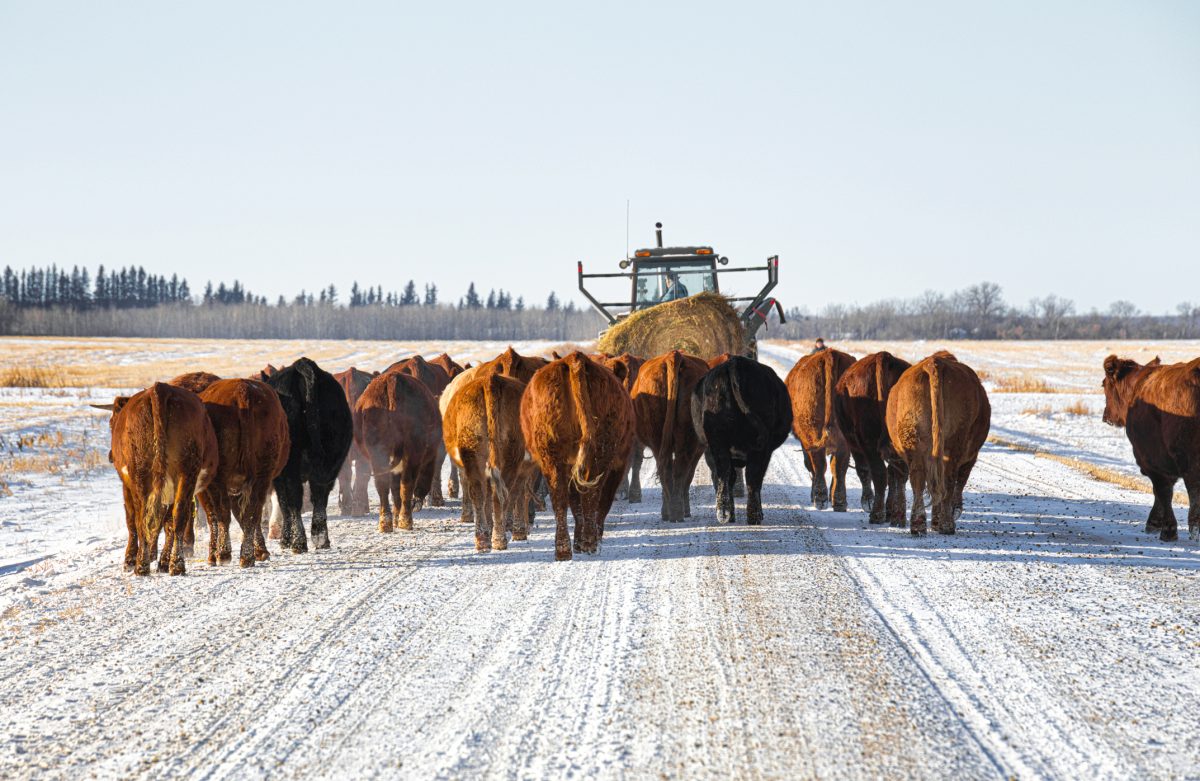Amid reports of violence involving a farm tractor and trucks — and seizures of weapons — the protest blockade that shut Alberta’s busiest U.S. trade corridor is reported to be winding down starting Tuesday.
Several media outlets on Monday quoted organizers of the blockade at the Canada-U.S. border crossing at Coutts, Alta. as saying they would leave the area Tuesday morning.
Protestors in vehicles including commercial trucks, pickups and farm tractors formed a blockade halting traffic through the Coutts crossing, southeast of Lethbridge, and its sister crossing at Sweetgrass, Mont. starting Jan. 29. Single lanes of traffic later reopened but were blocked again Friday.
Read Also

U.S. livestock: Cattle sink ahead of semi-annual inventory report
Chicago cattle futures fell on Thursday ahead of the USDA’s semi-annual cattle inventory report. Hog futures were mixed. Most-traded April…
That blockade was formed in tandem with a demonstration still underway in Ottawa concerning current COVID-19 vaccine mandates for cross-border truckers, among a number of grievances related to pandemic-related public health policy and federal politics generally.
The Ottawa protest and Coutts blockade — along with several other blockades formed at major Canada-U.S. crossings across the country, including at Windsor, Ont. and Emerson, Man. — on Monday became the subject of the federal government’s declaration of a “public order emergency” under the Emergencies Act.
According to the government’s release Monday, the declaration allows it to regulate and prohibit “public assemblies, including blockades, other than lawful advocacy, protest or dissent” and to designate and secure places where “blockades are to be prohibited” such as at international borders or approaches to same. It also blocks foreign nationals from entering Canada with “intent to participate in or facilitate a prohibited assembly.”
The declaration is effective for up to 30 days and subject to confirmation from both houses of Parliament.
The protestors’ stated plan to leave Coutts also comes amid damaging reports of violence at the blockade, plus 13 arrests Monday among those attending.
Specifically, Alberta RCMP said Monday, “a large farm tractor and a semi truck, both involved in the blockade, attempted to ram a police vehicle” on Sunday evening.
The RCMP member involved “was able to reposition and avoid the collision” and both the tractor and semi truck alleged to be involved in that incident have since been seized.
On Monday afternoon, RCMP said, a northbound semi approached the Mounties’ checkstop north of nearby Milk River when “the driver accelerated and drove towards our members.” The driver of that vehicle “swerved at the last moment” and was later arrested nearby “for Criminal Code offences.”
Also on Monday, RCMP said they “became aware of a small organized group within the larger Coutts protest” and had received information “that this group had access to a cache of firearms with a large quantity of ammunition… (and) a willingness to use force against the police if any attempts were made to disrupt the blockade.”
RCMP on Monday morning carried out a search warrant on “three trailers associated to this criminal organization” and seized handguns, 13 long guns, a “large quantity of ammunition,” high-capacity magazines, “multiple sets” of body armour and a machete.
Eleven people were arrested at that time, RCMP said; another person was arrested later Monday after being stopped by police on the highway en route to the protest site, at which time “two weapons were seized.”
RCMP said Monday they would “resume efforts to end the illegal blockade” at Coutts and “encourage all participants who are involved in this illegal action to leave immediately or relocate to the designated site for the legal protest.”
“Our objective was to be here peacefully,” Marco Van Huigenbos, a protest organizer at Coutts, was quoted by CBC as saying later Monday. “To keep that message going, we want to peacefully leave Coutts and return to our families.”
‘Serious risks’
Alberta Premier Jason Kenney, writing Monday on Twitter, made note of the arrests of people “believed to be involved in a potentially violent cell at the Coutts blockade” and hailed the “tactical operation that neutralized this potentially violent threat without incident.”
Also, Kenney wrote Monday, in spite of “threats and intimidation directed at tow truck operators and dealers, (the province) has successfully procured and staged the heavy equipment needed to remove commercial vehicles” at the protest site.
Kenney reiterated to remaining protestors that “it’s time to go home” and that their “continued violation of the rights of your fellow Albertans will not be tolerated.”
Separately, federal Agriculture Minister Marie-Claude Bibeau said in a statement Monday that she met with “meat industry representatives from across Canada” to talk about the blockades’ impact on “the transportation of live animals and beef exports, the movement of feed for livestock and the overall food supply for Canadians.”
The industry reps on the call “told me that the blockade is having a significant impact on the livelihood of Canadian farm families and businesses who cannot sustain any more delays,” she said, and that “shipments of animals are being delayed and cancelled, which is creating serious risks to animal welfare.”
Allowing animals, feed and feed ingredients to again flow across the border “is essential to support producers and protect the welfare of animals travelling between Canada and the U.S.,” she said, noting border transit delays “also heighten the risk of spoilage of perishable goods” such as fruit and vegetables.
With the public order emergency now declared, she said, cabinet officials “are monitoring the situation closely and working with our federal and provincial partners to identify and mitigate disruptions.”
In a joint statement last week, several national- and provincial-level transport, trade, manufacturing and distributing groups warned that “hundreds of millions of dollars in cross-border trade” including perishables and other goods, “are being impacted or lost because of ongoing blockades.”
Farmer and food processor groups including the Canadian Federation of Agriculture, Canadian Agri-Food Trade Alliance, Canadian Cattlemen’s Association, National Cattle Feeders’ Association, Canadian Pork Council, Canadian Meat Council, Canadian Produce Marketing Association and Canadian Horticultural Council made a separate joint statement Friday calling for “immediate action by all parties to fully reopen Canada’s trade corridors.”
Canadian federal rules for cross-border travel by truckers and other essential workers were updated effective Jan. 15. Those rules currently require any Canadian truckers and other essential workers who are unvaccinated against COVID-19 and returning to Canada to follow the same quarantine protocols as other unvaccinated Canadians returning to Canada. Unvaccinated foreign truckers attempting to enter Canada are to be turned away.
The U.S. government has had the same rules in place for foreign unvaccinated truckers since Jan. 22 — with the effect of prohibiting unvaccinated Canadian truckers from bringing freight into the United States. — Glacier FarmMedia Network















